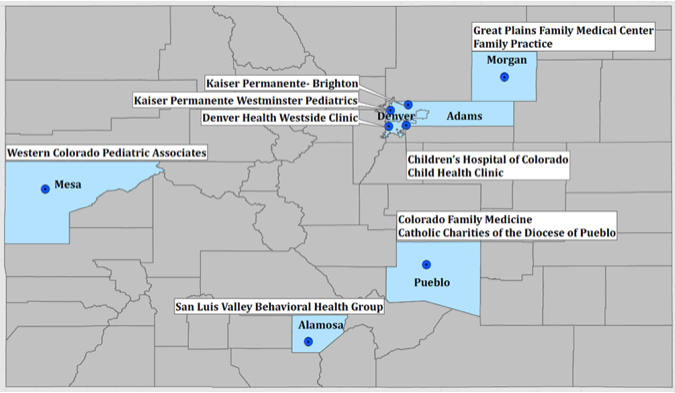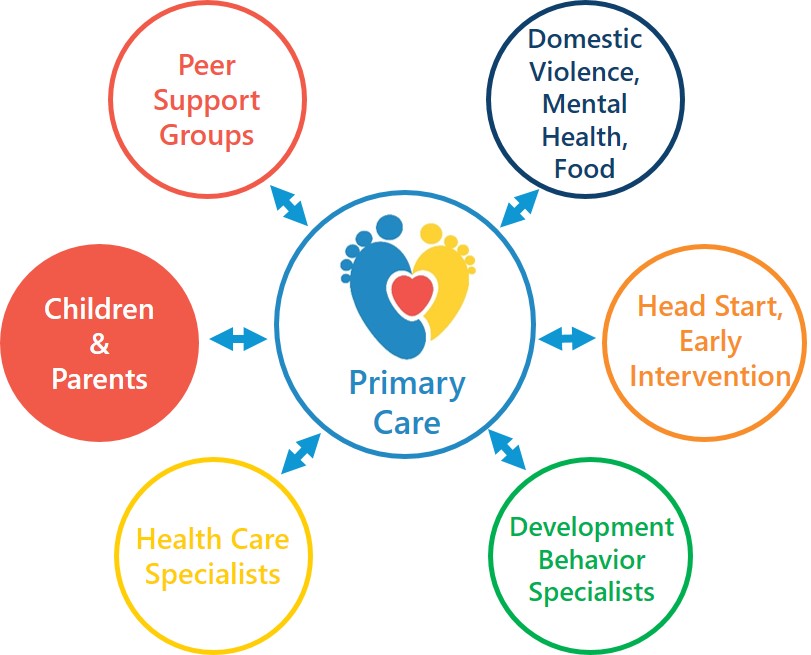Modern Medicaid Alliance Featured Medicaid Solution: ZERO TO THREE’s HealthySteps Program
The Challenge
Children’s health needs extend beyond preventive and therapeutic health care services. Beginning at birth, children need access to community and social supports that ameliorate the negative impacts of social determinants of health which are directly linked to their short- and long-term health and development. Traditional pediatric primary care only focuses on the physical health of the child. To promote healthy child development, comprehensive care addressing the needs of the whole family must become the new standard of care.
Medicaid Solution
 HealthySteps, a unique program of ZERO TO THREE, addresses these needs. The model, which is operational in 119 sites nationwide, embeds a developmental specialist, known as a HealthySteps Specialist (HSS), within the pediatric care team. The HSS connects with families during and between well-child visits, from birth to age three (or birth to five for some HealthySteps sites) as part of the primary care team. HSS offer screening and support for common and complex parenting concerns that physicians often lack time to address, including feeding, behavior, sleep, attachment, depression, social determinants of health, and adapting to life with a baby or young child. HSS are trained to provide families with parenting guidance, support between visits—often including parenting groups and voluntary home visits—referrals, and care coordination, all specific to families’ needs, which extends the reach of primary care beyond the clinic walls and into the community.
HealthySteps, a unique program of ZERO TO THREE, addresses these needs. The model, which is operational in 119 sites nationwide, embeds a developmental specialist, known as a HealthySteps Specialist (HSS), within the pediatric care team. The HSS connects with families during and between well-child visits, from birth to age three (or birth to five for some HealthySteps sites) as part of the primary care team. HSS offer screening and support for common and complex parenting concerns that physicians often lack time to address, including feeding, behavior, sleep, attachment, depression, social determinants of health, and adapting to life with a baby or young child. HSS are trained to provide families with parenting guidance, support between visits—often including parenting groups and voluntary home visits—referrals, and care coordination, all specific to families’ needs, which extends the reach of primary care beyond the clinic walls and into the community.
HealthySteps seeks to achieve healthy child development for all children, but particularly low income, vulnerable populations. The program, which predominately serves low income children and their families, seeks to prevent and ameliorate the effects of Adverse Childhood Events (ACEs) and supports, educates, screens and refers parents to necessary services understanding that children are only as healthy as their caregivers.
Medicaid Results
HealthySteps serves over 30,000 families each year and is anticipated to serve 1,350 children by the end of 2017 in Colorado. Short-term, annualized interventions through the program are estimated to save the Medicaid program between $811,000 and $1.2 million annually. These savings come from improving well-child visit and immunization rates, promoting access to early dental health care, encouraging appropriate use of care, and providing additional support services to families that reduce costs to the overall system. Annualized savings to Medicaid per family are up to $1,150, with an annual return on investment of 83%.
 Interventions focusing on early childhood health and well-being have an array of long-term cost saving impacts as well. Healthy social and emotional development are strongly linked to school readiness and education attainment. Failing to address infant developmental delays and childhood mental health disorders in early childhood increases the need for intervention across multiple state programs over the life of a child and into adulthood.
Interventions focusing on early childhood health and well-being have an array of long-term cost saving impacts as well. Healthy social and emotional development are strongly linked to school readiness and education attainment. Failing to address infant developmental delays and childhood mental health disorders in early childhood increases the need for intervention across multiple state programs over the life of a child and into adulthood.
Beyond the short-term cost savings, the program has led to an uptake in key services for those involved according to ZERO TO THREE findings. For example, 100% of infants involved in the program received at least one well-child visit by six months of age and 96% of children were screened for physical health, developmental, communication, problem solving, and learning delays using the age appropriate Ages and Stages Questionnaire (ASQ) within the last 12 months. In regards to caregivers, 91% of caregivers showed increased knowledge of age-appropriate developmental milestones for their child and increased understanding of positive parenting behaviors and parent-child relationships while 90% of caregivers received information or training on injury prevention during any well-child visit. Ninety percent of caregivers, identified as needing services, received a referral to available community resources. Over ninety percent of caregivers were screened for intimate partner violence, and 93% of caregivers received information about optimal inter-birth intervals and/or family planning within six months postpartum. Women also experienced improvements, as 96% of mothers were screened for depressive symptoms within six months of enrollment in HealthySteps.
A third-party implementation study is currently underway that will help capture additional outcomes and longer-term cost savings from innovations taking place across the United States.